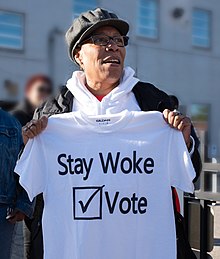
Back ووك Arabic Woke Bulgarian Woke Catalan Woke Danish Woke German Woke Greek Woke Esperanto Woke Spanish Woke Basque ووک (لفظ) Persian

Woke is an adjective derived from African-American Vernacular English (AAVE) originally meaning alertness to racial prejudice and discrimination.[1] Beginning in the 2010s, it came to encompass a broader awareness of social inequalities such as racial injustice, sexism, and denial of LGBT rights. Woke has also been used as shorthand for some ideas of the American Left involving identity politics and social justice, such as white privilege and reparations for slavery in the United States.[2][3][4]
The phrase stay woke has been present in AAVE since the 1930s. In some contexts, it referred to an awareness of social and political issues affecting African Americans. The phrase was uttered in recordings from the mid-20th century by Lead Belly and, post-millennium, by Erykah Badu.
The term woke gained further popularity in the 2010s. Over time, it became increasingly connected to matters beyond race such as gender and identities perceived as marginalized. During the 2014 Ferguson protests, the phrase was popularized by Black Lives Matter (BLM) activists seeking to raise awareness about police shootings of African Americans. After the term was used on Black Twitter, woke was increasingly used by white people, who often used it to signal their support for BLM; some commentators criticized this usage as cultural appropriation. The term became popular with millennials and members of Generation Z. As its use spread internationally, woke was added to the Oxford English Dictionary in 2017.
By 2020, the term became a sarcastic pejorative among many on the political right and some centrists in Western countries, targeting various leftist and progressive movements. Woke was seen as offensive by commentators who felt it disparaged advocates of identity and race-related ideologies. Subsequently, terms like woke-washing and woke capitalism emerged to criticize those using social or political causes for financial or political gain, rather than sincere commitment, a phenomenon often referred to as "performative activism".
- ^ Calcutt, Clea (October 19, 2021). "French education minister's anti-woke mission". Politico. Archived from the original on October 20, 2023. Retrieved November 27, 2022.
- ^ Cite error: The named reference
Morgan 2020was invoked but never defined (see the help page). - ^ Cite error: The named reference
Romano 2020was invoked but never defined (see the help page). - ^ Cite error: The named reference
Mirzaei 2019was invoked but never defined (see the help page).